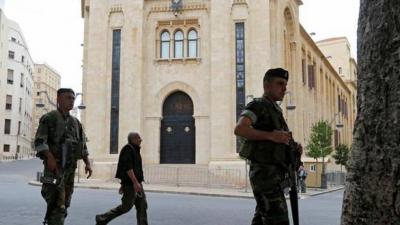The opposition forces failed to unify their stance on a candidate for the presidency of the government, which reflects negatively on upcoming challenges, especially the presidential elections, as acknowledged by the opposition parties themselves. Notably, the Lebanese Forces and the Progressive Socialist Party had earlier declared their intention to agree on a single candidate, which did not materialize.
The fragmentation was evident in how opposition votes were distributed among party blocs, change deputies, and independents. The Democratic Gathering bloc, led by MP Taymour Jumblatt, which consists of four deputies, along with the Lebanese Forces (also four deputies), several independents, and ten change deputies, nominated former ambassador Nawaf Salam. Meanwhile, the Lebanese Forces bloc decided not to nominate any figure, even though they were the first to propose Salam's name during the parliamentary consultations in 2020.
Bilal Abdullah, a deputy in the Socialist Party, emphasized the respect for democracy and diversity of opinions but expressed his confusion about the justification for the blank votes or the absence of a nomination from any side. He remarked that if the goal was to weaken the position of the prime ministry, as had occurred in the parliamentary election, the same could recur in the presidential election. Abdullah expressed his dissatisfaction with the lack of a unified opposition stance, stating that "if there was no opportunity to bring forward its candidate." He added that the confrontation should be between two political projects in the country, and the opposition should have presented a united front in preparation for this challenge. However, this current fragmentation, juxtaposed with the other side's unity, reflects negative indicators regarding its ability to bring forth a centrist president capable of rescuing Lebanon.
The Lebanese Forces justified their decision not to name Salam without proposing another candidate for two main reasons: first, that Salam did not present a clear program, and second, that the stage would be too difficult for whoever is tasked with forming a government. Charles Jabbour, responsible for media and communications, stated that the Lebanese Forces has worked since the outset of the parliamentary elections to push for a united opposition stance. When nearing the assignment deadline, communications were opened with various parties in this direction, but upon realizing that a unified stance was unachievable—evidenced by the opposing directions of the opposition—they opted for the approach of not nominating anyone.
In addition to these reasons, Jabbour mentioned, "One should not overlook that Salam or any other candidate would not benefit from being assigned at this stage, as it would mean burning their name. They would find themselves between the less bad and the worse—if they could not form a government, which is likely, they would be held responsible for the collapse; if they successfully formed a government, it would be under the conditions of the presidency."
Similar to Abdullah, Jabbour views the opposition's inability to agree on a single candidate as a "negative and extremely dangerous indicator," hoping that every challenge serves as a lesson for future ones. He added, “the assignment today is important, but it is not crucial. It comes in a transitional phase for a short period, but the presidential challenge is pivotal; it will reintroduce authority for six years, necessitating the opposition to reflect upon itself and reassess.”
In the same context, the Kataeb Party, which nominated Salam, called for unity around this nomination. Party leader MP Sami Gemayel stated after a meeting with the Kataeb bloc and the president: “Based on the election results, where the Lebanese were clear about their desire to change the existing approach, we tried to play our role as an opposition party to the governance of the country for over eight years by suggesting a prime minister with a different approach and vision to extricate Lebanon from its current crisis, which is Ambassador Nawaf Salam.”




